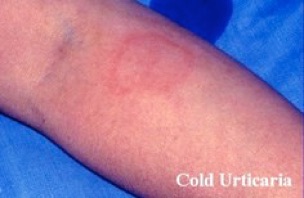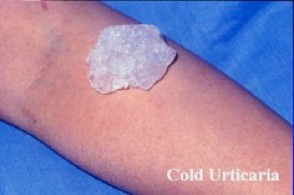Cold urticaria and cold anaphylaxis

IMPORTANT The information provided is of a general nature and should not be used as a substitute for professional advice. If you think you may suffer from an allergic or other disease that requires attention, you should discuss it with your family doctor. The content of the information articles and all illustrations on this website remains the intellectual property of Dr Raymond Mullins and cannot be reproduced without written permission.
Summary
Cold urticaria is a type of physical hives/urticaria. The trigger is cooling of the skin eg. cold air or water per se. How cold the temperature needs to be to trigger symptoms varies from person to person.
Causes
While various disorders have been associated with this condition, most of the time the cause is not found. Often the hives just start for no obvious reason. Sometimes they will start after an infection, after a drug or after a sting allergic reaction.
Cold urticaria lasts for years
The duration of symptoms is at least five years in the vast majority of patients. IN a study examining all te patients I had seen over 20 years, at least half still had symptoms lasting at least 10 years.
Symptom triggers
Walking on cold floors in winter, swimming in cool water, walking in cold air or even walking from a warm room to a cooler one can trigger symptoms. IN a study examining
Management
There is no cure. Management centres around avoidance of cold triggers where possible, and trying medication like antihistamines or with H2 blockers (ulcer tablets) in combination, when symptoms are annoying or predictable or regular. Most patients do not respond to standard doses of antihistamines and high doses are generally required. Other medication trialled in case reports include dapsone, the antibiotic doxycycline 200 mg per day for a month or omalizumab anti-IGE antibody, although the vast majority of those with cold urticaria will not meet the criteria for subsidy of this expensive medication. My own experience and research is that most patients end up modifying their lifestyle to keep warm and find routine antihistamines of very limited benefit
Sometimes symptoms can be serious
The major clinical concern in patients with more serious sensitivity to cold, is swimming in cool or cold water. Cooling of core body temperature can result in massive histamine release leakage of fluid internally, difficulty breathing and sometimes a drop in blood pressure. There is a risk of loss of consciousness and drowning if patients are swimming on their own or away from the shore.
Therefore, even in patients who have not suffered from anaphylaxis, they need to be warned about the possibility and take appropriate precautions when swimming. They should avoid swimming in cold water completely, should take preventive medication a couple of hours beforehand (with no guarantee it will work completely) should try water before they get in and avoid it if they get symptoms, never swim alone, swim close to shore if swimming at the beach and get out if any symptoms occur.
Warn the surgeon!
Operating theatres are cold and so are intravenous fluids used during surgery. People with cold urticaria should also warn surgeons and anaesthetists to take appropriate precautions before general anaesthetics since otherwise and allergic -like reaction might be blamed erroneously on medication rather than being cold.
Other risks
Other potential causes of accidental exposure to prolonged and intense cold might include cross-country skiing, which may be unwise in those with cold induced urticaria, going camping and getting drenched and cold in remote areas and crossing rivers and sometimes, playing sport in winter time when grass is wet. Covering up with warm clothing and prophylactic medication may reduce the frequency and severity of symptoms. Issuing patients with a MedicAlert bracelet is appropriate in case they are in a car accident and cannot notify others of their sensitivity.
Treating acute symptoms
If cold exposure occurs and symptoms arise, the person needs rewarming, can be given extra antihistamines but if there is any dizziness, they should be laid flat and they should call for help. eg. ambulance service. In those with severe symptoms with minimal body cooling, sometimes adrenaline/EpiPen is recommended as part of their action plan in selected cases.
References
1: Singleton R, Halverstam CP. Diagnosis and management of cold urticaria. Cutis. 2016 Jan;97(1):59-62.
2: Maurer M, Fluhr JW, Khan DA. How to Approach Chronic Inducible Urticaria. J Allergy Clin Immunol Pract. 2018 Jul-Aug;6(4):1119-1130. doi: 10.1016/j.jaip.2018.03.007.
3: Kulthanan K, Hunnangkul S, Tuchinda P, Chularojanamontri L, Weerasubpong P,
Subchookul C, Maurer M. Treatments of cold urticaria: A systematic review. J
Allergy Clin Immunol. 2019 Apr;143(4):1311-1331. doi: 10.1016/j.jaci.2019.02.005.
4: Metz M, Schütz A, Weller K, Gorczyza M, Zimmer S, Staubach P, Merk HF, Maurer M. Omalizumab is effective in cold urticaria-results of a randomized placebo- controlled trial. J Allergy Clin Immunol. 2017 Sep;140(3):864-867.e5. doi:10.1016/j.jaci.2017.01.043.
5: Jain SV, Mullins RJ. Cold urticaria: a 20-year follow-up study. J Eur Acad Dermatol Venereol. 2016 Dec;30(12):2066-2071. doi: 10.1111/jdv.13841.
6: Claudy A. Cold urticaria. J Investig Dermatol Symp Proc. 2001 Nov;6(2):141-2. doi: 10.1046/j.0022-202x.2001.00028.x.


Last reviewed 3 June 2020